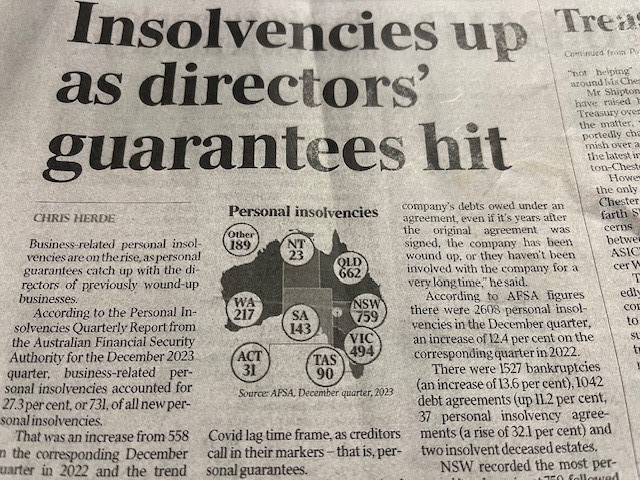Law reform
ASIC’s updated guidance on liquidator registration and discipline; AFSA; and the ART
05/10/2024
Registration and discipline processes liquidator and trustee registration Administrative Review Tribunal
ASIC has released updated regulatory guidance on statutory committee registration and discipline processes, and related issues: see Revised Regulatory Guide ...
Coercive control and insolvency
01/10/2024
ASIC insolvent trading coercive control
ASIC has asked registered liquidators to “stay alert” for signs of family and domestic violence when conducting insolvency administrations.[1] ASIC ...
Personal insolvency figures up and ‘reforms’ pending
07/09/2024
AFSA ASBFEO Statistics
Personal insolvencies increased in July 2024, to 1157 compared with the lows of 851 in June 2024, and 929 in ...
ASIC’s civil penalty regime – an academic review
06/09/2024
ASIC penalties deterrence
In the midst of a focus on the enforcement activity of ASIC following a critical Senate Committee report,[1] we have ...
ASIC’s revised guidance on insolvency practitioner offence reporting – RG 16
06/09/2024
AFSA ASIC offence reporting PJC Insolvency Inquiry 2022
ASIC has issued revised guidance on insolvency practitioner offence reporting obligations – RG 16 External administrators and controllers: Reporting of ...
Insolvency numbers in decline
24/08/2024
Statistics PJC Insolvency Inquiry 2022
Numbers of insolvencies of individuals and companies have fallen dramatically over the years, which we may find represents a fundamental ...
Splitting ASIC 2024 and the 2010 Senate Committee Report
13/08/2024
ASIC Senate Committee PJC Insolvency Inquiry 2022
In the discussions about separating ASIC’s tasks following the July 2024 Senate Economics References Committee report – Australian Securities and ...
Some proposed personal insolvency reforms in Australia
With the federal government yet to respond to the PJC Report on corporate insolvency of July 2023, which recommended a ...
Senate report on ASIC’s investigation and enforcement roles – July 2024
04/07/2024
ASIC Senate Committee
The Senate Economics References Committee has issued its Report – Australian Securities and Investments Commission – investigation and enforcement, of ...
The 2023 Parliamentary Joint Committee Report and insolvency law reform?
17/06/2024
data PJC Insolvency Inquiry 2022
While the federal government is yet to give its response to the PJC Report on Corporate Insolvency of July 2023, ...
Insolvency law terms – what do they mean?
14/05/2024
language
While insolvency law uses many and varied terms to describe its various processes for dealing with an insolvent business, no ...
Insolvency law’s elephants in the room
13/05/2024
INSOL Academics PJC Insolvency Inquiry 2022
Professor Jason Harris and I will be presenting a session at INSOL Academics Colloquium in San Diego USA on 22 ...
ASIC’s review of offence reporting – RG 16
13/04/2024
PJC Insolvency Inquiry 2022 investigations
In response to the PJC Report, although a bit premature, ASIC is reviewing its RG 16, on offence reporting obligations, ...
Bankruptcy and mental ill health
04/04/2024
mental health
Justice John Logan of the Federal Court has raised some interesting issues in an otherwise straightforward bankruptcy judgment concerning the ...
Small business sole trader insolvencies
08/03/2024
Statistics PJC Insolvency Inquiry 2022 MSMEs
A recent newspaper report on the trend of insolvencies in small business was interesting for the reason that it acknowledged ...
AFCA financial compensation scheme of last resort
The federal government has announced [1] that a compensation scheme for victims of financial services misconduct will start from 2 ...
Report on the Franchising Code of Conduct – and insolvent franchisors
08/02/2024
ACCC franchises PJC Insolvency Inquiry 2022
Further to my comments of September 2023 below as to a review of the franchising code of conduct, that review ...
New corporate definitions of director, officer and asset
01/02/2024
ALRC Corporations Act director property
Following the ALRC’s work on Ch 7 of the Corporations Act, attention has already been given to legislative changes tidying ...
Corporations Act redrafting – ch 5?
23/01/2024
OPC ALRC 141 Corporations Act
Some years ago, I suggested to a Treasury officer that Ch 5 of the Corporations Act be redrafted and simplified. ...
The new Administrative Review Tribunal and law for the relief of insolvent debtors
03/01/2024
AAT legislative drafting OPC ART
On 7 December 2023, the government introduced legislation that would abolish the Administrative Appeals Tribunal (AAT) and establish what it ...
A winding up vs an administration – s 440A(2)
30/12/2023
winding up DOCA derisory dividends
The situation where a creditor applies for a winding up of a company under the Corporations Act, and while that ...
Insolvency statistics 2023
30/12/2023
Statistics
Each of our insolvency regulators, ASIC for corporate, AFSA for personal, has issued its statistics for 2022-2023 right on the ...
Law reform – small business redundancy exemption removed
Among the many changes introduced by the Fair Work Legislation Amendment (Closing Loopholes) Act 2023 are those in Schedule 1 ...
The AFCA financial complaints scheme and bankruptcy – no appeal
24/12/2023
AFCA AFSA divisible property financial complaints
Further to my case comment below, AFSA has, belatedly, advised that it is not appealing this decision of Justice Rares ...
Categories
Main Menu

























